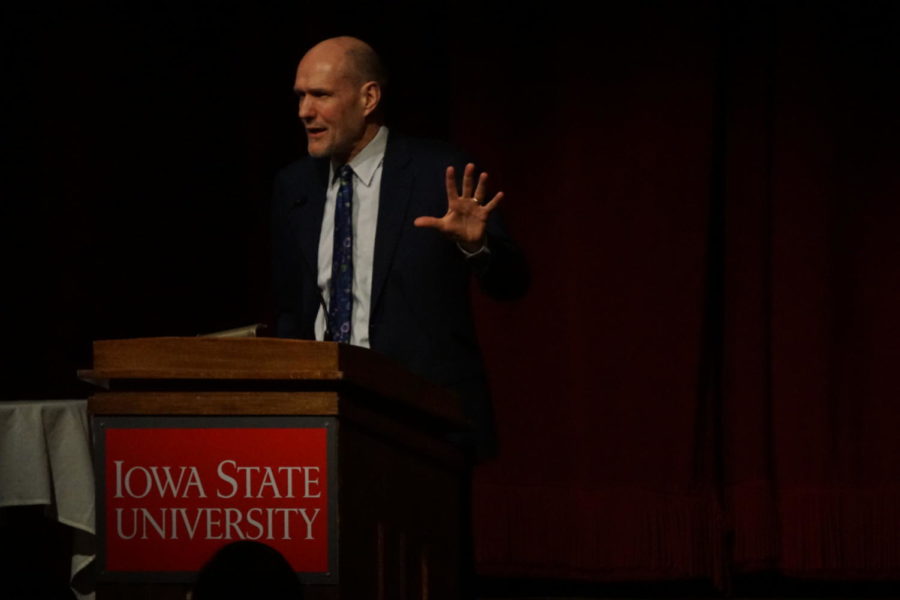Stephen Walt on Where is U.S. Foreign Policy Headed
April 22, 2018
An expert recently said American foreign policy was responsible for many issues the United States currently faces.
Stephen Walt, professor of international relations at Harvard University, spoke to hundreds of Iowa State students and faculty on current U.S. foreign policy, and his vision for its future through a lecture titled “Where Is U.S. Foreign Policy Headed?”
He said a strategy the United States government has been employing since the end of the Cold War, known as the ”liberal hegemony,” meaning it tries to use American power to spread traditional liberal principles of democratic governments, human rights and open-market economies has caused most of the issues.
He then discussed some turmoils the United States has been dealing with, including long-term rivalry with China, “worse than anytime since the Cold War” relations with Russia, declining strength of democracy, financial crises and terrorism attacks.
“Instead of defending American territory and working to uphold the balance of power in key strategic regions, liberal hegemony seeks to spread democracy in markets around the world, peacefully, if possible, but if necessary, with military force,” Walt said.
Walt is a prominent figure in the international relations field. He also taught at Princeton University and the University of Chicago, and is a fellow at the American Academy of Arts and Sciences and co-chair of the editorial board of “International Security.”
Walt expressed his view on the current United States foreign relations during the lecture.
“I think it’s fair to say that there’s more uncertainty on this topic than there has been in any time in recent history,” Walt said.
As a strategy for foreign policy, liberal hegemony is fundamentally flawed, Walt said, because it expands the number of places the United States is formally committed to defend, and trying to spread liberal values to other countries is threatening to countries that are not liberal democracies.
“Some of those countries are able to do various things to get in our way,” Walt said. “It’s one of the reasons countries are getting interested in acquiring nuclear weapons.”
Walt said by 2016, the government’s accumulated failures had open the door for then-candidate Donald Trump, because when he criticized the existing foreign policy, there were not many foreign policy successes to contradict him.
When Trump entered office or even during his campaign, he promised to give America a new set of strategies and the “American First” policy; however, over time the U.S. foreign policy is not changing nearly as much as people might think, Walt said. The Trump administration has continued to carry out the policies his predecessors formulated.
“It’s true that he is paying much less attention to democracy promotion, to nation building and to human rights, but the differences here are not as dramatic as we might think,” Walt said.
Walt used the recent airstrike in Syria as an example.
“This is again a classic right out of the D.C. playbook. It’s not going to effect the situation in Syria at all, but it makes us look like we are doing something,” Walt said. “One percent of the deaths in the Syrian civil war were caused by chemical weapons. We got very excited and energized over the use of chemical weapons, but the vast majority people lost their lives in Syria were killed by ordinary weapons.
“We are still following the same blueprint, but now being managed by the least competent president in my remembering.”
Walt finished his thought with his suggestions for the Trump administration. He said the main goal of American foreign policy should be to prevent any other country from dominating its region the same way America dominates the Western atmosphere. Walt said there are no countries like that in Europe and the United States shouldn’t worry about Europe.
Even Russia is not a true threat, in military or economics, Walt said.
“The bad news is that China is a potentially dominant power in Asia and our allies in Asia are not strong enough to balance against China,” Walt said. “The United States has to still take the lead in forging a balancing coalition in Asia.”
As for the Middle East, Walt said the United States shouldn’t try to control the Middle East, shouldn’t take sides between countries, and should stop having “special relationships” with any countries in the Middle East, because none of these countries “deserves unconditionally, American support.”
Walt’s final suggestion is that government should deemphasize the role military power plays in the foreign policy and put a greater premium on peace. He said politicians rarely talk about peace now, because they don’t want to appear too idealistic and soft.
“Peace time tends to elevate to prominent people who are good at promoting human wealth or good innovation and good invention,” Walt said. “Warfare tends to elevate people who are good at using violence.”
Walt said under the ideal government polices, the United States should get out of nation building policies, reduce a military footprint in Europe and the Middle East, seek a better relationship with Russia over time and foster more attention on partnership in Asia.
Walt didn’t have confidence Trump is the president who would lead the United States to these conditions.
















